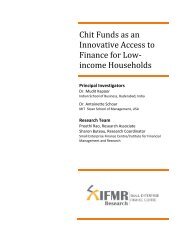Government of India Volume I: Analysis and Recommendations
Government of India Volume I: Analysis and Recommendations
Government of India Volume I: Analysis and Recommendations
You also want an ePaper? Increase the reach of your titles
YUMPU automatically turns print PDFs into web optimized ePapers that Google loves.
CONSUMER PROTECTION<br />
Table <strong>of</strong> <strong>Recommendations</strong> 5.9 Composition <strong>of</strong> the advisory council on consumer protection<br />
1. The advisory council will consist <strong>of</strong> persons who are consumers or persons representing the interests <strong>of</strong> consumers.<br />
2. The appointment <strong>of</strong> members <strong>of</strong> the council should also:<br />
(a) give a fair degree <strong>of</strong> representation to experts in the fields <strong>of</strong> personal finance <strong>and</strong> consumer rights;<br />
<strong>and</strong><br />
(b) take into account the need to ensure proper geographical representation from across the country.<br />
Table <strong>of</strong> <strong>Recommendations</strong> 5.10 Composition <strong>of</strong> the redress agency’s board<br />
The general superintendence, direction <strong>and</strong> management <strong>of</strong> the affairs <strong>of</strong> the redress agency will vest in its board <strong>of</strong><br />
directors, which will be comprised <strong>of</strong>:<br />
1. A chairperson to be appointed by the regulators through a selection process, in consultation with the Central<br />
<strong>Government</strong>.<br />
2. One <strong>of</strong>ficial to be nominated by each <strong>of</strong> the regulators.<br />
3. Four other members to be appointed by the regulators through a selection process.<br />
the insurance ombudsman although retail consumers will continue to have the option<br />
to approach other available forums, such as the consumer courts established under the<br />
Consumer Protection Act, 1986 <strong>and</strong> regular courts. In the future, if the <strong>Government</strong> is <strong>of</strong><br />
the view that the redress agency has acquired sufficient scale <strong>and</strong> expertise to be able to<br />
efficiently address all complaints from retail consumers, it will have the power to exclude<br />
the applicability <strong>of</strong> the Consumer Protection Act, 1986 to retail consumers covered by the<br />
redress agency.<br />
In any case, once a retail consumer opts for a remedy before the redress agency, it<br />
will not be permitted to institute fresh proceedings before another forum, either simultaneously<br />
or after a final order has been issued by the redress agency. Similarly, action<br />
initiated before any other forum will bar any action before the redress agency.<br />
The redress agency will be managed by a board <strong>of</strong> directors (see Table 5.10 for the<br />
composition <strong>of</strong> the board). The agency will be funded through a combination <strong>of</strong> allocations<br />
from the Central <strong>Government</strong>, st<strong>and</strong>ard fees payable by all financial service<br />
providers <strong>and</strong> a complaint-based fee that will be collected as <strong>and</strong> when a complaint is<br />
brought against a financial service provider.<br />
An effective dispute resolution body needs to be designed in a manner that ensures<br />
access, convenience, efficiency <strong>and</strong> speedy remedies. It needs to address two<br />
kinds <strong>of</strong> difficulties: a scenario where a genuine consumer is not able to obtain redress,<br />
<strong>and</strong> one where multiple cases are filed against a financial firm as a strategy <strong>of</strong> harassment.<br />
The Commission envisages the redress agency to function as a technologically<br />
modern organisation that will carry out video hearings, digital h<strong>and</strong>ling <strong>of</strong> documents,<br />
telephonic/online registration <strong>of</strong> complaints, maintenance <strong>of</strong> a high quality electronic<br />
database <strong>and</strong> online tracking <strong>of</strong> compensation payments. To ensure that the processes<br />
designed by the redress agency are in line with these requirements, the draft Code expressly<br />
requires the redress agency to put in place adequate systems, processes, technology<br />
<strong>and</strong> infrastructure to enable it to efficiently discharge its functions. The draft Code<br />
also empowers the regulators to impose service level requirements on the redress agency<br />
with measurable targets on matters such as the total cost to parties for proceedings before<br />
it, compliance cost for financial firms <strong>and</strong> time-periods for each step <strong>of</strong> the redress<br />
process. The redress agency will be accountable for meeting these targets with a requirement<br />
to explain any failure to do so. These measures will compel the redress agency to<br />
strive towards maximum efficiency in its processes <strong>and</strong> functioning.<br />
The draft Code allows the redress agency the discretion to open <strong>of</strong>fices anywhere in<br />
the country. The Commission intends that the redress agency will use this power to set up<br />
FINANCIAL SECTOR LEGISLATIVE REFORMS COMMISSION 51



